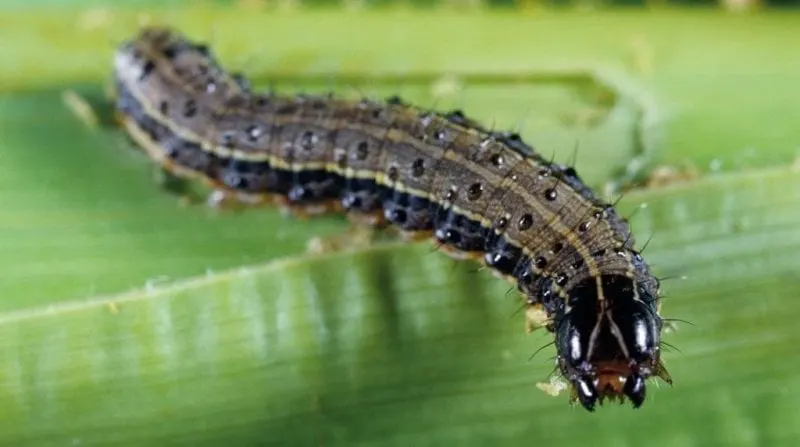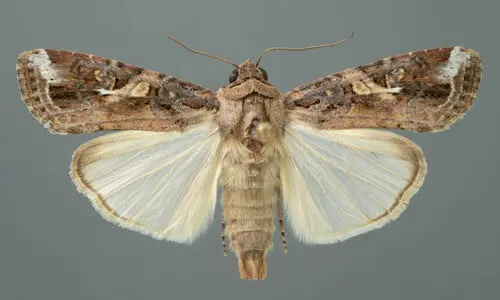GM versions of fall armyworm can effectively control the insect pest, study confirms
GM versions of fall armyworm can effectively control the insect pest, study confirms


The peer-reviewed research, published in BMC Biotechnology Journal, found that Oxitec Ltd.’s Friendly technology can effectively reduce populations of fall armyworm, offering hope for long-term protection against the pest.
“Our results provide promise for a new and valuable addition to future integrated pest management programs for fall armyworm, and for other pests in which insecticide resistance has become a significant challenge for farmers,” the authors wrote. “Preservation of, and reducing over-reliance on, existing tools whilst minimizing their ecological impact will improve food security, farmers’ livelihoods, and environmental sustainability.”
The proprietary Friendly technology works by genetically modifying (GM) insects to introduce a gene that prevents offspring of the pests from surviving into adulthood. The modified male fall armyworms are released into areas of infestation where they mate with wild females, reducing the number of female offspring in the next generation and thereby dramatically reducing the population. The introduced gene is self-limiting.
One major benefit of the approach is that it targets the problem pests, sparing beneficial insects and avoiding the off-target effects on the wider ecology often seen with the application of insecticides. It also addresses the problem of pests developing resistance to the insecticides meant to control them.
“The development of a strain of fall armyworm engineered to show conditional, female-specific mortality offers a new pest management option and resistance management strategy where fall armyworm threatens the effectiveness of insecticides and Bt crops,” the authors concluded.
Oxitec has successfully used its Friendly self-limiting insect technology with mosquitoes to control dengue, Zika and other diseases in Brazil and is currently conducting field trials in the United States. Brazilian regulators also approved commercial use of the Friendly fall armyworm, finding it safe for people, animals and the environment.
Though native to the Americas, the fall armyworm has spread across the globe, destroying crops in Asia, Australia and now Africa. Adult moths lay their eggs on the crops and when the caterpillars hatch and start feeding, they are extremely destructive, causing billions of dollars in annual crop damage and losses. They are particularly attracted to corn (maize), rice and sorghum, but will feed on other crops and plants.
The researchers found that GM fall armyworm moths strongly compete with wild-type males for mates, which is key to the technology’s success in the field. They also confirmed the self-limiting nature of the transgene in laboratory populations. “The gene is self-limiting, declining to extinction within a few [four to seven] generations,” the authors wrote. “In future applications on crops, the OX5382G trait is therefore not expected to persist in fall armyworm populations after releases stop.”

Additionally, the researchers modelled the effect of releasing male-selecting, self- limiting adult moths into target fall armyworm populations. Their modelling shows that development of fall armyworm resistant to Bt corn is significantly delayed, leading to sustained fall armyworm management over a much longer period.
“Our simulations showed that without the release of OX5382G males, genetic resistance to insecticidal proteins increases rapidly due to natural selection,” the authors wrote. “The presence of insecticidal proteins in biotech crops suppresses fall armyworm populations initially, but as the resistance allele frequency increases, population size rebounds and returns to carrying capacity. To mitigate this threat, our simulations show that releases of OX5382G moths, even in relatively small numbers, have the potential to delay the accumulation of resistance alleles in a fall armyworm population, and suppress the size of that population. These findings are consistent with those of previous modelling studies and empirical studies with another lepidopteran.”
Oxitec officials heralded the results of the independent research. “These results demonstrate the immense promise of Oxitec’s fall armyworm to transform the effectiveness and sustainability of critical food crop production, in Brazil and across the world,” a company press release stated.
“Our Friendly fall armyworm is being prepared to transform the sustainability of corn production in Brazil and other countries, and to support food security for the long-term,” said Oxitec CEO Grey Frandsen in the release. “Having spent significant time across Brazil’s agricultural regions, I’ve seen first-hand the threat posed by fall armyworm on Brazilian farms. We now have a solution with the potential to protect existing tools and deliver truly long-term and environmentally friendly protection of corn against this threat.”
A version of this article was published at Alliance for Science and is reposted here with permission. You can follow Alliance for Science on Twitter @ScienceAlly

 | Videos | More... |

Video: Nuclear energy will destroy us? Global warming is an existential threat? Chemicals are massacring bees? Donate to the Green Industrial Complex!
 | Bees & Pollinators | More... |

GLP podcast: Science journalism is a mess. Here’s how to fix it

Mosquito massacre: Can we safely tackle malaria with a CRISPR gene drive?

Are we facing an ‘Insect Apocalypse’ caused by ‘intensive, industrial’ farming and agricultural chemicals? The media say yes; Science says ‘no’
 | Infographics | More... |

Infographic: Global regulatory and health research agencies on whether glyphosate causes cancer
 | GMO FAQs | More... |

Why is there controversy over GMO foods but not GMO drugs?

How are GMOs labeled around the world?

How does genetic engineering differ from conventional breeding?
 | GLP Profiles | More... |

Alex Jones: Right-wing conspiracy theorist stokes fear of GMOs, pesticides to sell ‘health supplements’




 Viewpoint — Fact checking MAHA mythmakers: How wellness influencers and RFK, Jr. undermine American science and health
Viewpoint — Fact checking MAHA mythmakers: How wellness influencers and RFK, Jr. undermine American science and health Viewpoint: Video — Big Solar is gobbling up productive agricultural land and hurting farmers yet providing little energy or sustainabilty gains
Viewpoint: Video — Big Solar is gobbling up productive agricultural land and hurting farmers yet providing little energy or sustainabilty gains Trust issues: What happens when therapists use ChatGPT?
Trust issues: What happens when therapists use ChatGPT? Fighting deforestation with CO2: Biotechnology breakthrough creates sustainable palm oil alternative for cosmetics
Fighting deforestation with CO2: Biotechnology breakthrough creates sustainable palm oil alternative for cosmetics California, Washington, Oregon forge immunization alliance to safeguard vaccine access against federal undermining
California, Washington, Oregon forge immunization alliance to safeguard vaccine access against federal undermining 30-year-old tomato line shows genetic resistance to devastating virus
30-year-old tomato line shows genetic resistance to devastating virus The free-range chicken dilemma: Better for birds, but with substantial costs
The free-range chicken dilemma: Better for birds, but with substantial costs ‘You have to treat the brain first’: Rethinking chronic pain with Sanjay Gupta
‘You have to treat the brain first’: Rethinking chronic pain with Sanjay Gupta
